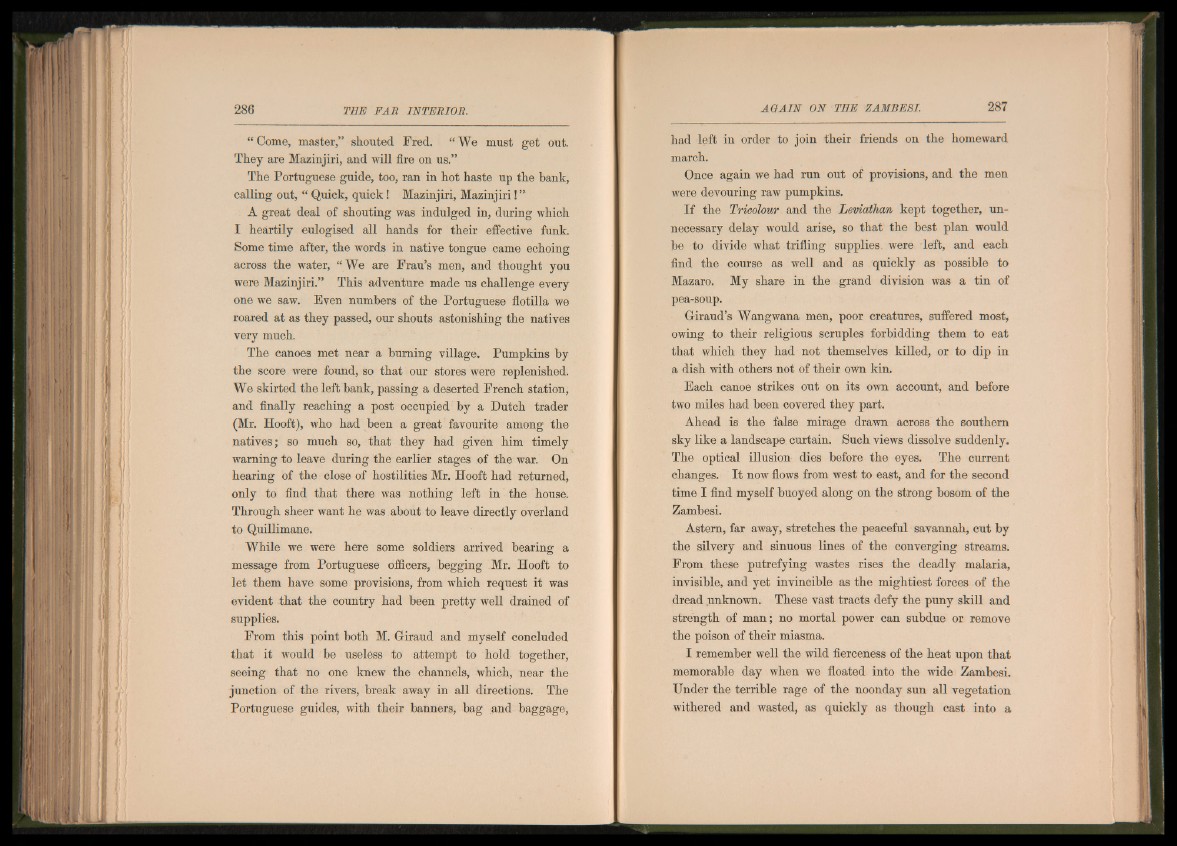
“ Come, master,” shouted Fred. “ We must get out.
They are Mazinjiri, and will fire on us.”
The Portuguese guide, too, ran in hot haste up the bank,
calling out, “ Quick, quick! Mazinjiri, Mazinjiri! ”
A great deal of shouting was indulged in, during which
I heartily eulogised all hands for their effective funk.
Some time after, the words in native tongue came echoing
across the water, “We are Frau’s men, and thought you
were Mazinjiri.” This adventure made us challenge every
one we saw. Even numbers of the Portuguese flotilla we
roared at as they passed, our shouts astonishing the natives
very much.
The canoes met near a burning village. Pumpkins by
the score were found, so that our stores were replenished.
We skirted the left bank, passing a deserted French station,
and finally reaching a post occupied by a Dutch trader
(Mr. Hooft), who had been a great favourite among the
natives; so much so, that they had given him timely
warning to leave during the earlier stages of the war. On
hearing of the close of hostilities Mr. Hooft had returned,
only to find that there was nothing left in the house.
Through sheer want he was about to leave directly overland
to Quillimane.
While we were here some soldiers arrived bearing a
message from Portuguese officers, begging Mr. Hooft to
let them have some provisions, from which request it was
evident that the country had been pretty well drained of
supplies.
From this point both M. Giraud and myself concluded
that it would be useless to attempt to hold together,
seeing that no one knew the channels, which, near the
junction of the rivers, break away in all directions. The
Portuguese guides, with their banners, bag and baggage,
had left in order to join their friends on the homeward
march.
Once again we had run out of provisions, and the men
were devouring raw pumpkins.
If the Tricolour and the Leviathan kept together, unnecessary
delay would arise, so that the best plan would
be to divide what trifling supplies were left, and each
find the course as well and as quickly as possible to
Mazaro. My share in the grand division was a tin of
pea-soup.
Giraud’s Wangwana men, poor creatures, suffered most,
owing to their religious scruples forbidding them to eat
that which they had not themselves killed, or to dip in
a dish with others not of their own kin.
Each canoe strikes out on its own account, and before
two miles had been covered they part.
Ahead is the false mirage drawn across the southern
sky like a landscape curtain. Such views dissolve suddenly.
The optical illusion dies before the eyes. The current
changes. I t now flows from west to east, and for the second
time I find myself buoyed along on the strong bosom of the
Zambesi.
Astern, far away, stretches the peaceful savannah, cut by
the silvery and sinuous lines of the converging streams.
From these putrefying wastes rises the deadly malaria,
invisible, and yet invincible as the mightiest forces of the
dread .unknown. These vast tracts defy the puny skill and
strength of man; no mortal power can subdue or remove
the poison of their miasma.
I remember well the wild fierceness of the heat upon that
memorable day when we floated into the wide Zambesi.
Under the terrible rage of the noonday sun all vegetation
withered and wasted, as quickly as though cast into a